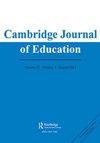Collateral human rights learning situations: what are they?
IF 1.5
3区 教育学
Q2 EDUCATION & EDUCATIONAL RESEARCH
引用次数: 1
Abstract
ABSTRACT This article furthers pedagogical knowledge on educating children about their human rights, specifically in school contexts, with the aim of elucidating the features and the collateral learning of educative situations through which children are supported to grow as rights-holders. The data, obtained from fieldwork in three Year 1 classes in Swedish schools, were analysed drawing on John Dewey´s theory of experience, growth and collateral learning. The findings show that, in everyday classroom interactions, teachers’ actions have implications for human rights learning. Four categories of collateral content were identified: a) Experience and respect equal value; b) Form, express and respect opinions; c) Take part and participate in individual and collective matters; d) Demonstrate understanding, and tolerance. It is argued that teachers’ pedagogical actions support children’s human rights learning in various everyday situations in the classroom, often in unintended and unplanned ways.附带的人权学习情况:它们是什么?
摘要本文进一步介绍了教育儿童人权的教学知识,特别是在学校环境中,目的是阐明支持儿童成长为权利持有人的教育情境的特征和附带学习。这些数据是从瑞典学校三个一年级班级的实地调查中获得的,根据约翰·杜威的经验、成长和附带学习理论进行了分析。研究结果表明,在日常课堂互动中,教师的行为对人权学习有影响。确定了四类抵押品内容:a)经验和尊重同等价值;b) 形成、表达和尊重意见;c) 参与和参与个人和集体事务;d) 表现出理解和宽容。有人认为,教师的教学行动支持儿童在课堂上的各种日常情况下学习人权,通常是以意想不到和无计划的方式。
本文章由计算机程序翻译,如有差异,请以英文原文为准。
求助全文
约1分钟内获得全文
求助全文
来源期刊

Cambridge Journal of Education
EDUCATION & EDUCATIONAL RESEARCH-
CiteScore
5.30
自引率
4.30%
发文量
35
期刊介绍:
Cambridge Journal of Education publishes original refereed articles on all aspects of education, with a particular emphasis on work that contributes to a shared understanding amongst academic researchers, theorists, practising teachers, policy-makers and educational administrators. The journal also welcomes the submission of systematic review articles that summarise and offer new insights into specific areas of educational concern. With a wide international readership, Cambridge Journal of Education publishes contributions drawn from different educational systems and cultures enabling continued in-depth discussion of global educational theory, policy and practice. The journal’s Special Issue programme encourages and stimulates focused discussion and engagement with significant themes and responses to topics raised by readers and contributors. Cambridge Journal of Education welcomes proposals for future editions.
 求助内容:
求助内容: 应助结果提醒方式:
应助结果提醒方式:


